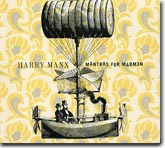|
Harry Manx
Mantras For Madmen
Dog My Cat Records |

Harry Manx is by far one of the
most creative and innovative blues artists around today. Actually,
categorizing his music as blues --- or, for that matter, any other genre
--- is difficult. Little of what the Canadian multi-instrumentalist does
could be considered as straight, 12-bar blues.
His music certainly has a blues mojo
to it in kind of an otherworldly way. Forget trying to put it in a
nicely defined category. It's music that needs to be heard and felt in
order to be understood.
Manx spent 12 years living and
traveling through India, and that experience is part of what makes his
music so unique and refreshing. He seamlessly combines blues and folk
music with Indian sounds. It's really remarkable how well these
seemingly diverse musical forms come together. Manx described it best in
the liner notes to his latest release, Mantras For Madmen, by
stating, "The way I see it, Blues is like the earth and Indian music is
like the heaven. What I do is find the balance between the two." He does
it very well.
On his sixth release, the second on his own
Dog My Cat
label, Manx uses background harmony vocals on many of the cuts, giving
the disc a more soulful, churchy feeling than his previous CDs (all of
which are quite good!).
The disc opens with "Where Fools Die," on which Manx plays mostly
straightforward folk guitar, before launching into one of the more
unique numbers here. "San Diego - Tijuana" is a J.J. Cale original about
Mexican nationals begging to be taken across the border to the U.S.;
what's interesting is the way Manx uses an Indian stringed instrument,
the mohan veena, to play the Mexican guitar parts.
"The Point of Purchase," with Manx primarily playing the banjo, has a
real country blues feel but with more of a mystical atmosphere. He goes
down the 'almost the blues' road again with the slow tune "A Single
Spark," which features nice harmonica accompaniment from Steve Marriner
and beautiful background vocals from Linda Kidder, Joani Bye and Helen
Davis.
"Your Sweet Name" is an uptempo blues
number highlighted by John Reischman's nimble mandolin picking and
punctuated by Manx's work on the mohan veena and Niel Golden's rhythm on
the tabla, a traditional Indian percussion instrument.
For me, the real gem of this CD is Manx's version of Robbie Robertson's
"It Makes No Difference." He turns it into a mournful blues, with the
background vocals giving the number a backwoods gospel vibe. Clocking in
at just under four minutes, this song ends far too quickly. Just hit the
replay button to listen to it again and again.
Emily Braden shares vocals with Manx
on "It Takes A Tear." Ms. Braden has a rich, soulful voice that compels
the listener to 'google' her name to find out more about this very
promising, young singer. She'll undoubtedly be heard from in the future.
Reischman's tasteful mandolin playing behind the harmony vocals is
exquisite; he really is an unsung hero of this disc.
Mantras For Madmen closes with a slow, ethereal instrumental, "Talkin'
Turban," on which Manx shows that the mohan veena is an instrument that
really could have had a place in the Mississippi Delta instead of
halfway around the world. One can only imagine what Charley Patton or
Son House would have done with a mohan veena had they gotten their hands
on one 70 years ago.
Harry Manx just gets better and better with each disc. Mantras For
Madmen is one of the best CDs I've heard this year ... it's
definitely 'top ten' caliber.
--- Bill Mitchell